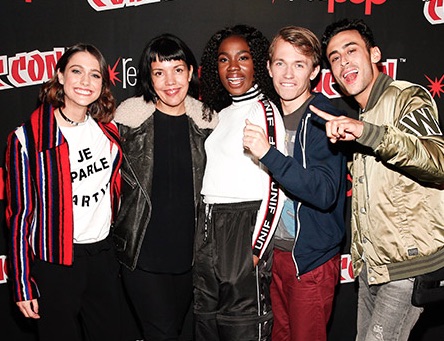The Five Spot: Sarah Barnett

The smarter way to stay on top of broadcasting and cable industry. Sign up below
You are now subscribed
Your newsletter sign-up was successful
For the past two and a half years, Sarah Barnett has enjoyed a homecoming without ever having to leave home. The U.K. native and adopted New Yorker has been running BBC America, where she worked stateside in the 2000s following a 12-year run at the BBC in London, handling radio and TV projects. Barnett recalls leaving her first stint at BBCA in 2005 for SundanceTV after realizing she didn’t want “to be that Brit that only works for British companies.” But she has relished the return.
Barnett is now firmly planted in the U.S., living in New York during the week while enjoying weekends with her husband in their upstate country home, where she reads, hikes, dabbles in gardening and watches a lot of TV. “There are never enough hours in a day to watch television,” she says.
Most of her hours are spent shepherding an ambitious programming slate that includes BBCA’s newest original, Dirk Gently’s Holistic Detective Agency, starring Elijah Wood and premiering Oct. 22. The offbeat mystery, which debuted at New York Comic-Con earlier this month, is a “fresh, fun and a completely wild ride,” says Barnett. An edited transcript of her conversation with B&C contributor Stephanie Robbins follows.
What led you to a career in television?
I don’t know that I ever really had a fixed idea of what I wanted to be when I grew up, but I do remember being a teenager fantasizing about being in the middle of a crowded studio with a clipboard telling people where to go. It was actually weirdly prophetic because I ended up working at the BBC on live shows. I loved that energy of having to think on your feet and make swift decisions. My brain works best in that kind of situation. I guess I had a weird visual imagining of it.
What has changed since you were last at BBC America? How have you changed?
It’s gone from a network that wasn’t Nielsen-rated to one that is much more professionalized, with a real sense of its brand and audience and some big shows that really matter to people. [For me], I fail to metabolize wine in the way I used to—tragic. I’m less caught up in the drama of each incident and have less sense of personal annihilation around failures, better equilibrium and an understanding that failures really do often lead to the right discoveries.
The smarter way to stay on top of broadcasting and cable industry. Sign up below
Orphan Black’s Tatiana Maslany won her first Emmy this year, but many critics have said the show plateaued in recent seasons. Were you surprised at the timing of the win?
We’ll take it at any life cycle of the series, because she deserves it. I think, probably, the consensus is that season 3 was not the season that creatively delivered on the core of the show. Her truly extraordinary and unusual performance with what she had to do in that show sat in the milieu of the entertainment industry’s minds as someone who so deserved it. There was enormous goodwill from both the industry and the viewers.
What do you think of U.S. adaptations of British series?
There needs to be a unique vision around the adaptation. The Office is a great example of that. The U.S. version that ran for many seasons became its own thing and was brilliantly inspired by the material. Another was HBO’s The Night Of, which was based on the British series Criminal Justice. The U.S. version of Coupling that was made many years ago didn’t have enough of a beating heart.
Are there current international shows that you think would succeed with U.S. audiences?
I think British shows are exporting so well. Technology is driving so many ways of watching TV content. Shows that might not work so well on a linear network can land so beautifully on OTT channels and on-demand. At Sundance, we were the first network to air subtitled shows, but now you see that on streaming services.
